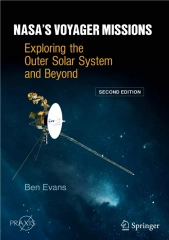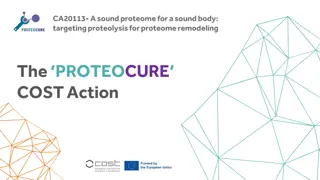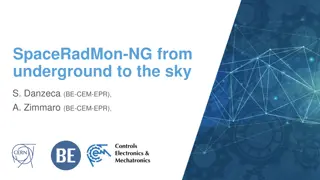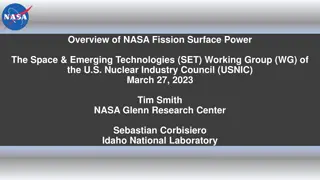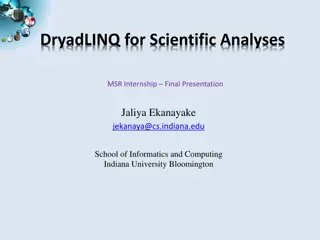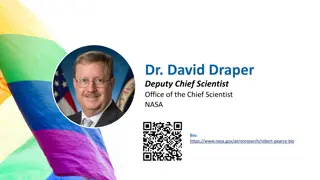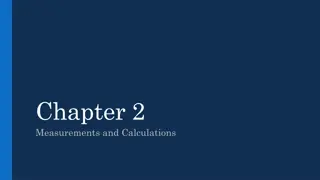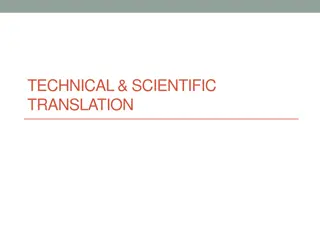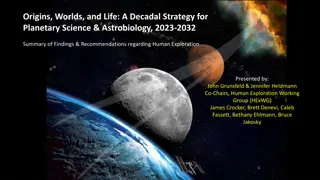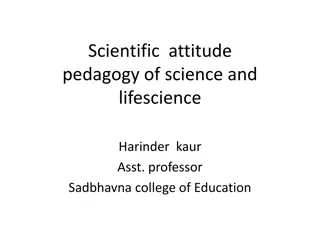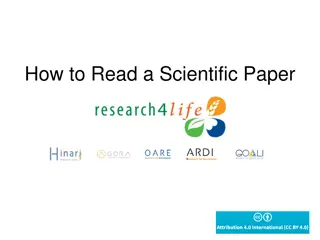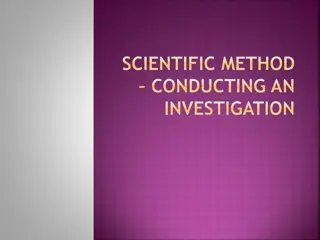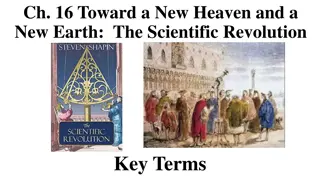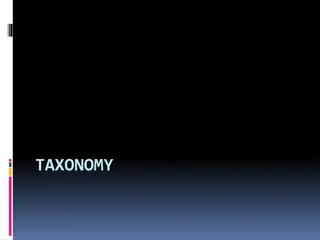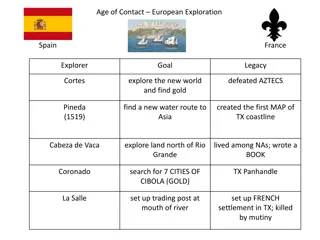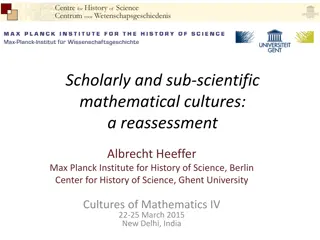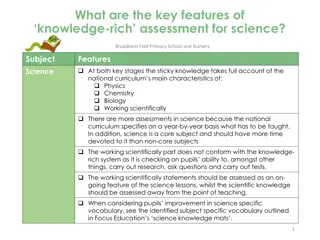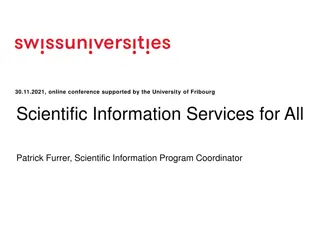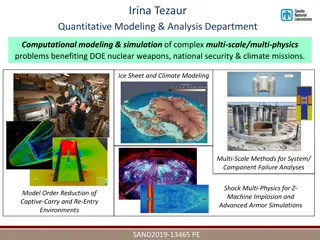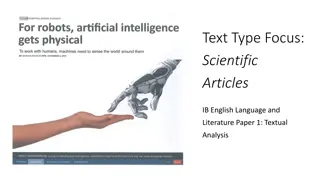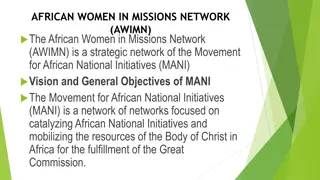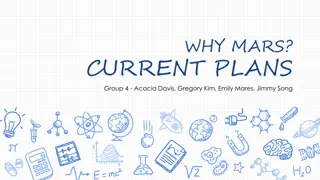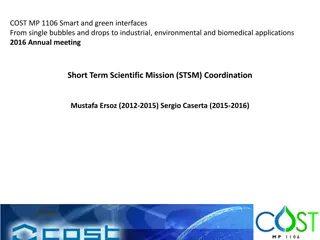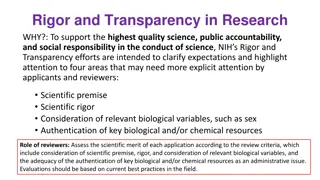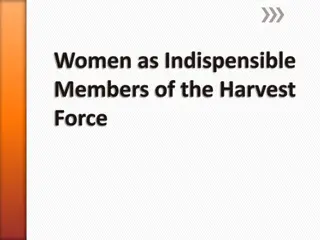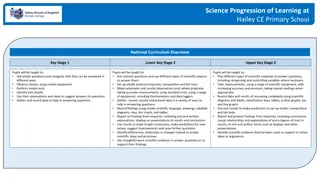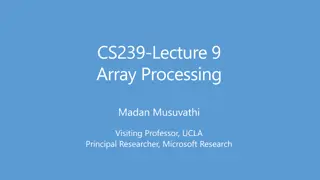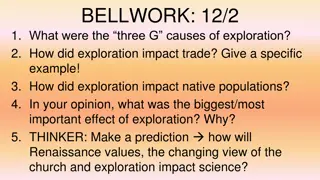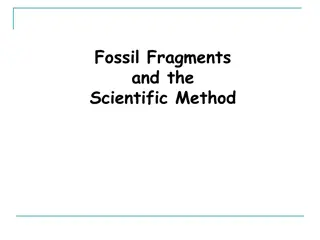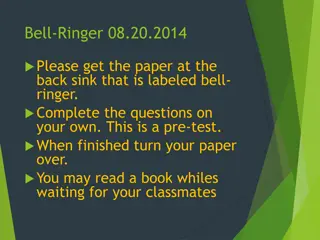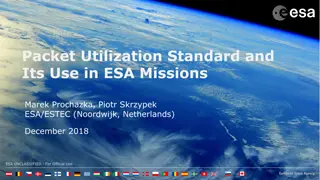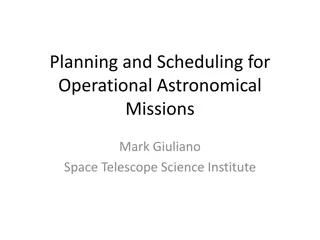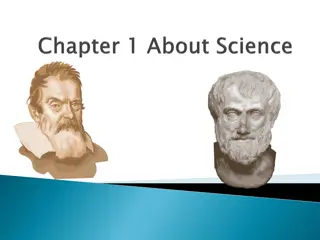NASA Integrated Lunar Science Strategy in the Artemis Era Implementation Plan
This implementation plan outlines strategic lunar programs, human exploration missions, and science objectives to achieve decadal-level goals at the Moon. It addresses the recommendations for lunar science priorities and aims to integrate human exploration with robotic missions for enhanced scientif
40 views • 20 slides
Audiobook⚡ NASA's Voyager Missions: Exploring the Outer Solar System and Beyond
\"COPY LINK HERE ; https:\/\/getpdf.readbooks.link\/3031079221\n\nPDF_ NASA's Voyager Missions: Exploring the Outer Solar System and Beyond (Springer Praxis Books) | NASA's Voyager Missions: Exploring the Outer Solar System and Beyond (Springer Praxis Books)\n\"\n
0 views • 6 slides
Enhancing Scientific Literacy in Early Years Play-Based Learning
This PhD research proposal explores scientific literacy among children in play-based learning, focusing on everyday concepts and their application to scientific understanding. The study aims to implement Vygotsky's sociocultural theory to enhance children's scientific literacy through Vision 1 and V
7 views • 19 slides
Exploring the PROTEOCURE COST Action: Targeting Proteolysis for Proteome Remodeling
The PROTEOCURE COST Action focuses on targeting proteolysis for proteome remodeling, aiming to enhance Europe's scientific and technological capacity through collaboration across various fields and career stages. Participating in this initiative offers financial support, scientific networking, and c
0 views • 17 slides
SpaceRadMon-NG: Revolutionizing Radiation Monitoring in Space Missions
The SpaceRadMon-NG is a cutting-edge radiation monitoring device designed for CubeSats, offering advanced capabilities for measuring Total Ionizing Dose (TID) and High Energy Hadrons (HEHs) fluence. Developed as a next-generation solution, it aims to enhance diagnostic and environmental monitoring i
4 views • 15 slides
Understanding Climate Change through Scientific Inquiry
Explore the role of science in addressing climate change, identifying scientific questions, discussing different disciplines involved, and analyzing the strength and limitations of scientific methods. Engage in activities to understand how scientific questions are formulated and categorized for inve
2 views • 22 slides
NASA Fission Surface Power Overview: Enabling Sustainable Exploration of Moon and Mars
NASA's Fission Surface Power systems are pivotal for enabling sustainable energy production on the Moon and Mars, essential for human and scientific exploration missions. These nuclear power systems offer robust and continuous power in challenging environmental conditions, making them vital for supp
2 views • 11 slides
Evaluation of DryadLINQ for Scientific Analyses
DryadLINQ was evaluated for scientific analyses in the context of developing and comparing various scientific applications with similar MapReduce implementations. The study aimed to assess the usability of DryadLINQ, create scientific applications utilizing it, and analyze their performance against
0 views • 20 slides
Overview of NASA's Office of the Chief Scientist and Deputy Chief Scientist Dr. David Draper
The Office of the Chief Scientist (OCS) at NASA plays a vital role in advising, advocating, and representing the agency in various scientific matters. Dr. David Draper serves as the Deputy Chief Scientist. The OCS leads initiatives related to scientific integrity, research security, citizen science,
2 views • 11 slides
Understanding the Scientific Method in Measurements and Calculations
Explore the scientific method in detail, including observing, collecting data, formulating hypotheses, testing hypotheses, and formulating theories with practical examples. Understand the importance of experimentation and how it leads to the development of scientific theories. Engage in activities t
6 views • 43 slides
Understanding Scientific Translation: A Vital Tool for Advancing Knowledge
Scientific translation is a specialized practice that involves accurately translating complex terms in fields such as science and technology to facilitate global knowledge exchange and advancement. It requires precision, fidelity to source material, and a deep understanding of technical terminology
0 views • 60 slides
Exploration Strategy for Planetary Science & Astrobiology 2023-2032
The decadal strategy outlines a comprehensive plan for planetary science and astrobiology, emphasizing the integration of human exploration activities with scientific objectives. Key elements include leveraging planned human space missions for new scientific opportunities and identifying areas of pl
9 views • 10 slides
Understanding Scientific Attitude and Pedagogy of Science
Scientific attitude involves open-mindedness, curiosity, rationality, and a desire for accurate knowledge. It includes characteristics such as critical thinking, respect for diverse viewpoints, and a reliance on verified information. Developing a scientific attitude involves studying superstitions,
1 views • 6 slides
Guide to Reading Scientific Papers
Understanding how to read a scientific paper is crucial for researchers and students alike. This guide covers the types of scientific papers, organization of a paper, and the key steps to properly read and comprehend complex scientific information. It explains the different sections of a paper, such
0 views • 20 slides
Understanding the Scientific Method: A Comprehensive Guide
Exploring the scientific method and principles of scientific investigation, this guide covers the mindset of a scientist, steps in the scientific method, and key components like formulating questions, conducting research, creating hypotheses, performing experiments, and analyzing results. It emphasi
1 views • 21 slides
Explore the Scientific Revolution
The Scientific Revolution marked a shift from the medieval worldview to a secular, rational, and materialistic perspective. Key terms such as geocentric and heliocentric conceptions, Cartesian dualism, rationalism, and the scientific method played pivotal roles in shaping this transformative period.
7 views • 10 slides
Understanding Taxonomy and Scientific Classification
Explore the world of taxonomy and scientific classification, from the discipline of classifying organisms to assigning scientific names using binomial nomenclature. Learn the importance of italicizing scientific names, distinguish between species, and understand Linnaeus's system of classification.
0 views • 19 slides
European Exploration and Missions in Texas: Legacy and Impact
Spain and France's explorers like Cortes, Pineda, Cabeza de Vaca, and others ventured into the New World, shaping Texas history with discoveries, conquests, and missions to convert natives. The journey includes expeditions, conflicts, and the establishment of missions that secured Texas for Spain bu
3 views • 3 slides
Reassessing Scholarly and Sub-Scientific Mathematical Cultures
Scholarly and sub-scientific mathematical cultures are reevaluated through the works of Jens Hoyrup, focusing on the organized nature of sub-scientific knowledge. The distinction between theoretical and practical knowledge, applications to mathematical cultures, and misconceptions related to the sup
0 views • 53 slides
Key Features of Knowledge-Rich Assessment for Science at Broadbent Fold Primary School
Sticky knowledge in science assessment at Broadbent Fold Primary School encompasses Physics, Chemistry, Biology, and Working Scientifically. Assessments are detailed due to the structured national curriculum, with a focus on specific scientific vocabulary and practical applications. The ongoing asse
0 views • 20 slides
Scientific Services for All - Enhancing Scientific Information and Services
This online conference, supported by the University of Fribourg, focuses on providing scientific information and services for all. Led by Patrick Furrer, the Scientific Information Program Coordinator, the event delves into creating a network of services, developing a coordination structure, and sho
0 views • 12 slides
Quiz Review on Scientific Method and Graphing
Explore a quiz review covering topics related to scientific method, graphing, and experimental design. Understand key concepts such as hypothesis, scientific law, theory, variables, and experimental control through detailed questions and images. Test your knowledge on laboratory safety, inferences,
0 views • 14 slides
Advancing Computational Modeling for National Security and Climate Missions
Irina Tezaur leads the Quantitative Modeling & Analysis Department, focusing on computational modeling and simulation of complex multi-scale, multi-physics problems. Her work benefits DOE nuclear weapons, national security, and climate missions. By employing innovative techniques like model order re
0 views • 6 slides
Unveiling the Art of Scientific Article Writing
Delve into the world of scientific articles in IB English Language and Literature Paper 1. Understand the purpose, use of language, comparisons, and visuals in scientific writing. Explore how these elements engage readers and simplify complex concepts through examples like stethoscopes and swamp wat
0 views • 9 slides
Empowering African Women in Missions Network (AWIMN) for the Great Commission
The African Women in Missions Network (AWIMN) is part of the Movement for African National Initiatives (MANI), focused on mobilizing women to play a significant role in fulfilling the Great Commission. AWIMN empowers women to participate in world missions and national strategies for reaching unreach
0 views • 5 slides
Current Mars Missions and Future Plans
Mars currently has 8 active missions operated by various space agencies, with 3 more planned for the future. Organizations involved include NASA, ESA, ISRO, and individuals like Elon Musk. Missions like Curiosity, ExoMars Trace Gas Orbiter, and Mars 2020 Rover aim to explore Martian climate, geology
0 views • 20 slides
Overview of STSM Activities and Budget Allocation for COST MP 1106 Smart and Green Interfaces from 2012 to 2016
This document outlines Short Term Scientific Missions (STSM) coordinated by Mustafa Ersoz and Sergio Caserta from 2012 to 2016 under COST MP 1106. It provides details of participants, hosting cities, countries, and budget allocations per year. The STSM activities cover a range of research areas rela
0 views • 5 slides
Fusion Science Department Enabling Research Projects 2021-2023
The Fusion Science Department Enabling Research Projects for 2021-2023 focus on developing novel fusion-relevant scientific and technological ideas. These projects, led by Principal Investigators, are distinct from main work packages and involve scientific planning, team collaboration, and resource
0 views • 11 slides
Enhancing Research Quality through Rigor and Transparency Initiatives
NIH's Rigor and Transparency efforts aim to uphold the highest standards in research, ensuring scientific premise, rigor, consideration of relevant biological variables, and authentication of key resources. Reviewers play a critical role in assessing these aspects to support robust and accountable s
0 views • 9 slides
Women as Indispensable Members of the Harvest Force: The Rise of Female Missionaries in the 19th Century
The 1800s saw the emergence of women missionary societies to address limitations faced by women in missions. British women played a pivotal role in funding and expanding missionary work globally. Female missionaries grew in numbers, challenging traditional gender roles. Their impact included promoti
0 views • 6 slides
Science Progression of Learning at Hailey CE Primary School Overview
This curriculum overview outlines the scientific learning progression for pupils at Hailey CE Primary School across Key Stage 1, Lower Key Stage 2, and Upper Key Stage 2. It details the development of scientific skills and knowledge, from asking simple questions and making observations to planning a
0 views • 11 slides
Spanish Rule in Texas: Missions and Presidios
The Spanish rule in Texas from 1682 to 1821 focused on establishing missions and presidios to control the region and counter the threat posed by the French. The missions served to convert Native Americans to Christianity and loyal subjects of Spain, while presidios offered protection. The first miss
0 views • 18 slides
SciDB: Revolutionizing Data Management for Scientific Analytics
SciDB is an open-source analytical database designed to meet the complex data management needs of the scientific community. It offers a unique array-based data model that supports advanced linear algebra operations crucial for scientific analytics. By addressing the limitations of traditional relati
0 views • 39 slides
Impact of Exploration and Scientific Revolution on Society
Exploration in the age of discovery was driven by economic, political, and religious motives, impacting trade and native populations while leading to significant scientific advancements and changes in societal beliefs. The Scientific Revolution challenged traditional views with new scientific method
0 views • 19 slides
Understanding the Scientific Method Through Fossil Fragments
Exploring the scientific method through the study of fossil fragments involves careful observation, sketching, and inference-making to understand past organisms and habitats. The steps of the scientific method, such as asking questions, conducting experiments, and drawing conclusions, are integral t
0 views • 32 slides
Understanding the Scientific Method: Pre-Test and Daily Agenda
Explore the process of science with a pre-test on the scientific method, followed by a detailed daily agenda covering activities like bell-ringers, reviews, and experimental design. Understand the nature of science, scientific reasoning, and the importance of variables, groups, and constants in inve
0 views • 51 slides
Texas History Overview: Missions, Colonization, and Important Figures
Explore the rich history of Texas through missions, colonization, and key figures such as Alvarez de Pineda, Massanet, Cabeza de Vaca, and more. Delve into topics like the first map of Texas, Spanish efforts to colonize, conflicts with France, and the unique cultures that shaped Texas. Discover how
0 views • 23 slides
Understanding Packet Utilization Standard in ESA Missions
Packet Utilization Standard (PUS) in ESA missions plays a crucial role in defining the application-level interface between ground and space. It covers various operational scenarios, provides onboard services, and allows tailoring for mission-specific requirements. The history, services, and use case
0 views • 17 slides
Understanding Astronomical Planning and Scheduling for Scientific Missions
Explore the operational aspects of astronomical missions led by the Space Telescope Science Institute, covering the Hubble Space Telescope and the upcoming James Webb Space Telescope. Learn about the goals, features, constraints, and use cases of planning and scheduling, along with mission character
0 views • 43 slides
Evolution of Scientific Thought and the Scientific Method
Explore the evolution of scientific theories and methodologies through the works of influential figures like Aristotle, Copernicus, Galileo Galilei, and Francis Bacon. From the geocentric beliefs of Aristotle to the heliocentric model proposed by Copernicus, witness the shift in paradigms and the em
0 views • 14 slides

